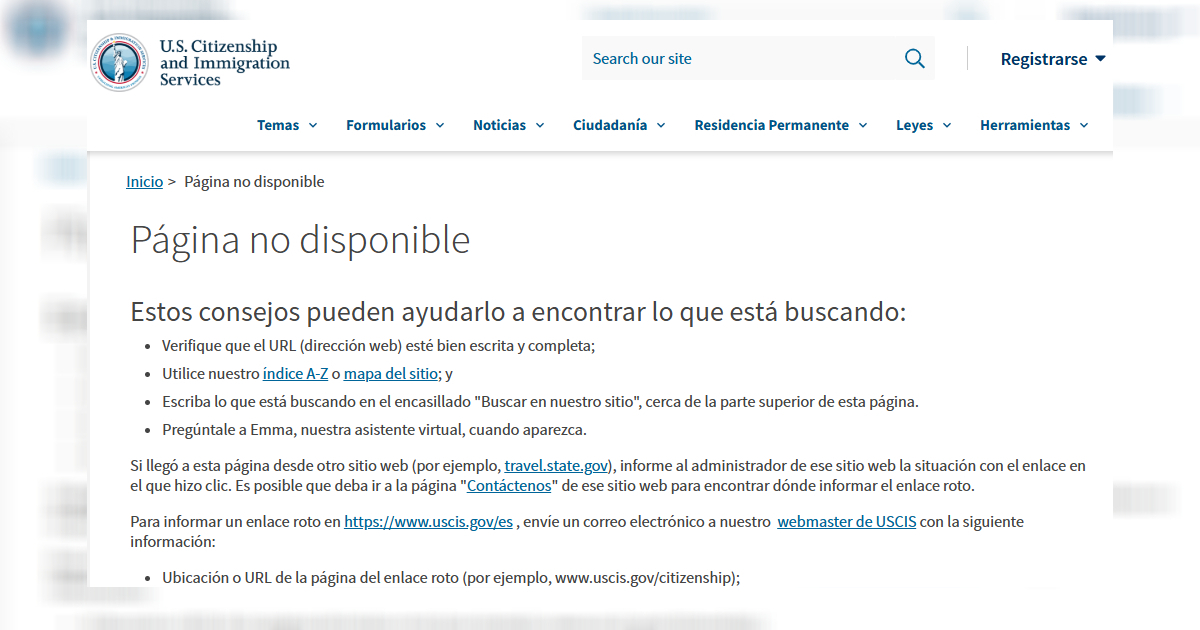
Related videos:
The U.S. Citizenship and Immigration Services (USCIS) removed the official page this Tuesday that contained information about the Humanitarian Parole program for citizens of Venezuela, Haiti, Cuba, and Nicaragua implemented by former President Joe Biden.
The section that provided details on how migrants from these countries could access this benefit is no longer available online, as we were able to confirm.
Despite the removal of the page, the previous information remains accessible for reference on the USCIS website, allowing users to review the prior content to understand the program's terms before its disappearance.
This modification on the website comes after a series of measures taken by the new president of the United States, Donald Trump, as he begins his second term.
Among the executive orders signed by Trump on Monday were key decisions that directly impact migration and national security.
Among these, the elimination of the Humanitarian Parole program stands out, which had been an important tool for the legal entry of half a million migrants from certain countries under humanitarian conditions.
Trump's executive orders also include the reinstatement of controversial immigration policies, such as the enforcement of the Migrant Protection Protocols (known as "Stay in Mexico"), the resumption of border wall construction, and the deployment of troops to the Mexico border to strengthen immigration control and combat drug trafficking.
Additionally, Trump signed a National Emergency declaration that mobilizes the National Guard and the Department of Defense to secure the country's southern border.
Regarding drug trafficking cartels, Trump ordered that groups such as Mara Salvatrucha (MS-13) and Tren de Aragua be designated as terrorist organizations, which would allow the U.S. government to impose economic sanctions and take more severe legal action against these groups.
Trump's measures have sparked strong reactions both inside and outside the United States.
The Mexican government has rejected the reinstatement of the "Remain in Mexico" program, deeming it a unilateral measure, though it is willing to negotiate specific agreements.
In addition, the elimination of Humanitarian Parole and the disappearance of the CBP One app, which allowed for online asylum applications, have created uncertainty in migrant communities, especially in Cuba, where the program was one of the few legal pathways to enter the United States.
With the elimination of Humanitarian Parole and the implementation of more restrictive policies, the outlook for Cuban, Venezuelan, Haitian, and Nicaraguan migrants seeking to enter the United States is expected to become more complex.
The Trump administration has made it clear that it will adopt a tougher stance on irregular migration, which could lead to mass detentions and deportations.
These measures, although welcomed by those who support a stricter immigration policy, have been strongly criticized by human rights advocates, who warn about the negative impact they may have on migrant families and communities.
Frequently Asked Questions about Trump's Elimination of Humanitarian Parole
Why did USCIS remove the Humanitarian Parole page?
USCIS removed the Humanitarian Parole page because the information is no longer current. This decision is part of a series of executive orders signed by Donald Trump at the beginning of his second term, aimed at tightening immigration policies, including the elimination of Humanitarian Parole.
What are the implications of the elimination of Humanitarian Parole for Cuban migrants?
The elimination of Humanitarian Parole complicates the migration landscape for Cubans, who are losing one of the few legal pathways to enter the United States. Furthermore, those who are already in the country under this program may face the possibility of deportation if they are unable to regularize their status through other legal means.
What additional measures has Trump taken regarding immigration policy?
In addition to eliminating Humanitarian Parole, Trump has reinstated immigration policies such as the Migrant Protection Protocols ("Remain in Mexico"), resumed the construction of the border wall, and declared a national emergency at the southern border. These measures strengthen a stricter and controversial approach to immigration management, eliciting both support and criticism.
How does the elimination of Humanitarian Parole affect asylum policies in the U.S.?
The elimination of Humanitarian Parole creates uncertainty in asylum policies, especially for migrants from countries like Cuba, Haiti, Nicaragua, and Venezuela. The disappearance of this legal pathway could increase illegal crossings and complicate the situation for those seeking asylum in the United States, putting more pressure on the immigration system and human rights organizations.
Filed under: